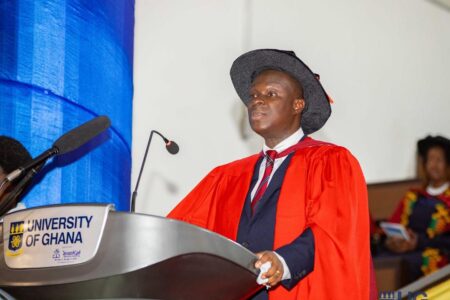The University of Ghana has held an inaugural lecture delivered by Professor Samuel Kwasi Dartey-Baah, themed “Dancing in the Boardroom: Leading with Groove, Balancing Tradition and Transformation in Ghana’s Leadership Landscape.”
Professor Dartey-Baah is a distinguished academic and leader whose work spans higher education, organizational development, and global leadership theory. As Director of Institutional Advancement at the University of Ghana, he has spearheaded initiatives in global engagement, resource mobilization, and alumni outreach. Notably, he led the World Bank Institutional Impact Project and facilitated the launch of five alumni groups across Africa within 24 months.
In his lecture, Prof. Dartey-Baah emphasized that leadership in today’s organizations is a complex process that demands a blend of skills, strategies, and emotional intelligence to effectively manage internal and external dynamics. He observed that Ghana’s leadership landscape reflects a delicate balance between deep-rooted traditions and the fast-evolving demands of modernization.
“The concept of ‘dancing in the boardroom’ captures the essence of effective leadership as an art form — requiring rhythm, flexibility, and an acute awareness of cultural and sociopolitical contexts. This metaphor illustrates how leaders must harmonize decisions, communication, and actions to align with organizational goals,” he explained.
He highlighted the pivotal role of emotional intelligence in leadership, especially within the Ghanaian context, where communal values and interpersonal relationships are central to workplace culture. Leaders with high emotional intelligence, he noted, are better equipped to build trust, manage conflict, and inspire others. By engaging with teams on a deeper emotional level, such leaders foster a more productive, collaborative, and satisfying work environment.
Professor Dartey-Baah further underscored that leadership in Ghana stands at the intersection of tradition and transformation. As Ghana’s economy becomes increasingly integrated into the global market, leaders are challenged to modernize their organizations while upholding traditional values that are vital to the nation’s identity and development.
He asserted that effective leadership must be grounded in an understanding of the country’s historical and cultural context, including the significance of respect for elders and the practice of communal decision-making.
“Political leadership in Ghana faces the ongoing challenge of aligning public sector reforms with traditional governance systems that emphasize collective consensus and deference to seniority. In the corporate arena, leaders must find ways to incorporate modern management practices while remaining sensitive to cultural values that resonate with Ghanaians,” he said.
Concluding his lecture, Prof. Dartey-Baah stated, “The balance between tradition and transformation is not static. It is a dynamic challenge that demands agility, innovation, and a commitment to inclusive and culturally grounded leadership. As Ghana’s leadership landscape continues to evolve, the most successful leaders will be those who can skillfully ‘dance’ between the past and the future—blending the strengths of both to build a prosperous and equitable society.”
By Madjid Diallo || GhanaNewsOnline

